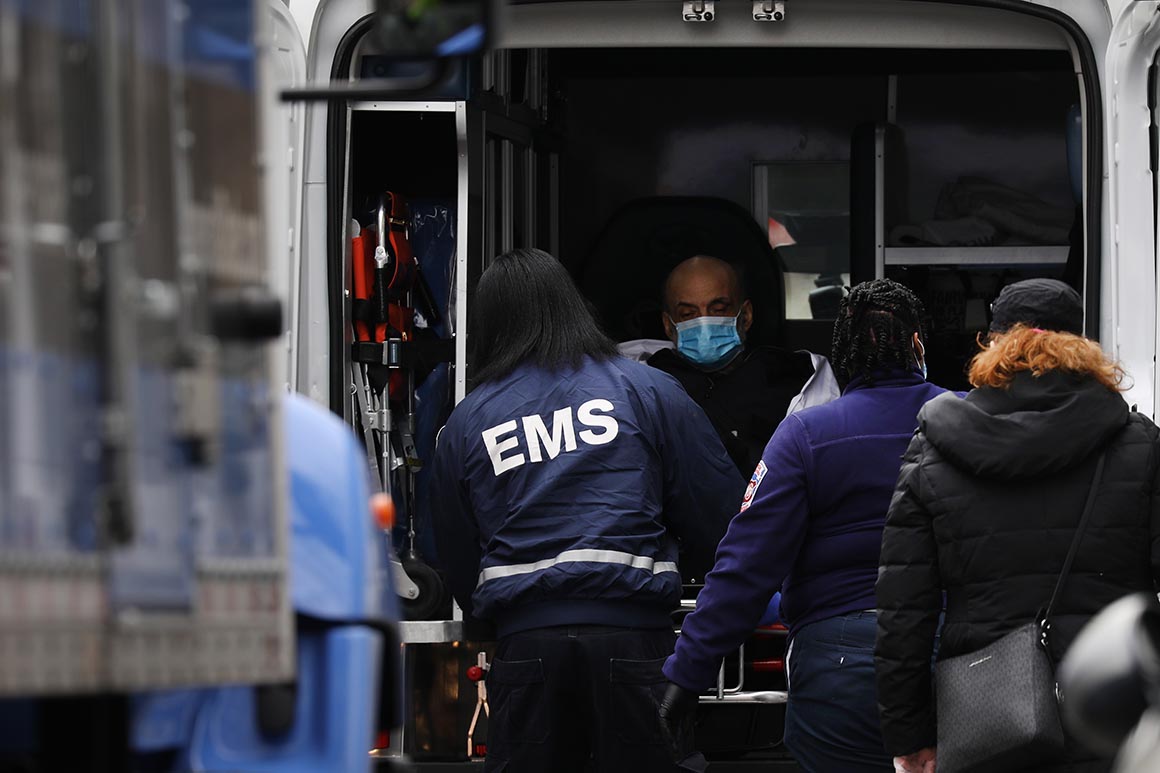
Basic tenets of communicating to the public during a pandemic — like articulating empathy and maintaining consistent messaging from government officials — have been ignored by the Trump administration during the coronavirus outbreak, dozens of public health professionals have told POLITICO in recent weeks. The effect of those missteps has been exacerbated in minority communities that were already distrustful due to long-running racial inequities in the health care system, they said.
It didn’t help, health professionals said, when U.S. Surgeon General Jerome Adams — one of two people of color communicating at the administration level about the coronavirus — remarked recently that African Americans and Latinos need to “step up” and stop drinking and smoking. Health experts and pastors said it was widely seen as victim-blaming and likely undermined the government’s credibility. (Adams has since been publicly sidelined.)
“Messaging is paramount in moments like this,” said Dr. Lauren Powell, former head of health equity for Virginia’s health department.
Powell added that the dearth of female and minority messengers could have negative consequences.
“This is a systemic problem across health care and many other industries where we don’t see enough people of color, women of color in particular in positions of power and authority,” said Powell, the executive director of Time’s Up Healthcare, a nonprofit foundation. “And that could certainly impact the way these vital public health messages fall on the ears of those of us in minority communities.”
The Centers for Disease Control and Prevention told POLITICO that educational outreach to minority populations is a “major priority” for the agency. Currently, CDC is reviewing new web content for racial and ethnic minority groups. Also in the works are social media campaigns, culturally relevant graphics and illustrations, and a public service announcement for the African American community, said Benjamin Haynes, a CDC spokesperson.
On April 28, the CDC will give a presentation to the National Council of Churches USA governing board meeting, virtually. The agency also is planning an April 30 coronavirus listening session with experts working on health disparities among racial and ethnic populations.
States focus media blitzes on black and Latino populations
Philadelphia City Councilwoman Maria Quiñones-Sánchez speculated that the reportedly high coronavirus rates among Latinos in her district were due to its density, language barriers and not enough people taking it seriously. “The message has to come from people they trust. I’ve [appeared] on Spanish media almost daily,” Quiñones-Sánchez said.
Quiñones-Sánchez also said she had to work to connect medical providers in her district to those who needed tests, and that until she stepped in they were not looped in to the city government’s efforts to combat the coronavirus. Doctors saw the problem as pressing enough that they created a messaging campaign to address it.
“We did a huge media blitz in Spanish. We created tens of thousands of fliers,” said Dr. Kathleen Reeves, a senior associate dean at Temple University’s Lewis Katz School of Medicine. “We worked with our community leaders to make them not only in Spanish but also to apply to the culture.”
In Milwaukee County, Wisconsin, where African Americans account for 42 percent of the coronavirus cases and 57 percent of deaths, the health department has heard concerns that traditional modes of messaging are not reaching black people.
“We are making a concerted effort to improve communications with targeted public service announcements created by ‘influencers’ in the African American community,” said Dr. Benjamin Weston, medical director for Milwaukee County. “That critical messaging is: Stay at home.”
SOMOS Community Care, a network of immigrant physicians, is working with New York state government to treat and educate Latino and Chinese immigrant populations. Its mobile testing sites are trilingual. And the network is working to educate people online and on Univision — informing Latinos about what telehealth is, how to get tested and the cost of treatment.
“Our people do not trust institutions,” Henry Munoz, co-founder of SOMOS Community care, said of Latinos. “That’s the No. 1 thing: A hospital is intimidating to people.”
The historic distrust among Latinos and African Americans is affecting willingness to seek treatment as coronavirus spreads.
“There is a very complicated and very deep history where the health care system is not really seen as a safe place for black people,” Blackstock, the doctor in Brooklyn, said, “and it’s something we can’t ignore.”
The history of distrust, Blackstock noted, goes back to the Tuskegee syphilis experiment and 19th century gynecologist J. Marion Sims, who experimented on enslaved black women. It’s also the result of racial health inequities, including high maternal mortality rates among black women, playing out for generations without being addressed by the government or private health systems.
“Remember that distrust is a symptom of the real reason: structural racism,” Blackstock tweeted last weekend.
‘We can’t wait until the vaccine’s here’
Gregorio Millett, an epidemiologist, said early misconceptions about the coronavirus — that it would likely be confined to communities with the means to travel, or the conspiracy theory that African Americans were immune — reminded him of the early years of the HIV epidemic.
“At the very beginning of the HIV epidemic, many communities of color thought this is only a disease of white gay men. And it was to our peril because HIV eventually made its way into black and brown communities,” said Millett, vice president of the nonprofit AIDS research organization, amFar.
“The messenger matters,” Millett said.
The distrust among minority communities, though not occurring in a vacuum, could have dangerous repercussions if it continues when a coronavirus vaccine emerges, doctors and public health experts said in interviews.
Source: politico.com
See more here: news365.stream






